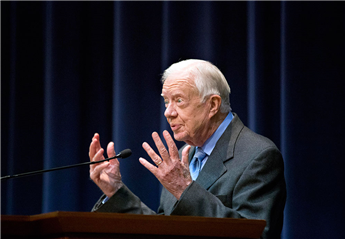Continuation of U.S. Decline is a Choice, Not an Inevitability
IBDEditorials.com

Superpower: Former President Jimmy Carter says America is "in an inevitable relative decline," but "not because of any fault of ours." Sorry, Mr. President: But it is your fault, and your current successor's, too.
There is nothing inevitable about American decline — any more than there was anything inevitable about America's rise to dominance in the world.
The nectar of liberty nourished us in that astonishing ascent, and we can again decide to be great. Indeed, choosing otherwise will lead not to American mediocrity but to the bloody fall of a secure free world.
So it is galling when the worst president of the 20th century excuses the worst president of the 21st century for dragging us down to global impotency.
Interviewed on MSNBC on Tuesday, Carter was asked, "How is the United States doing right now? Where are we?"
He replied that America is "in an inevitable relative decline," but "not because of any fault of ours," rather through "the combination of China and India and Brazil and South Africa and others" exercising an "economic and cultural influence" that "will replace a lot of the power and preeminence that the United States has enjoyed in the past."
Specifically, China will soon, according to Carter, "succeed the United States as the No. 1 economic power in the world." The U.S. is also less able "to change situations that we don't like around the world."
And all this "is not because of a defect or fault on the part of the president of the United States," the 39th president asserted. "It's just happening in the historical evolutionary, unavoidable circumstance."
Wrong. It isn't "just happening" — any more than the overthrow of the Shah of Iran and his replacement by the Ayatollah Khomeini while Carter was president "just happened."
The Khomeini regime remains in power over 35 years later. The whole threat of Iran arming itself with nuclear weapons today is Carter's doing. If, God forbid, an Iranian bomb ever incinerates a U.S. or European city, historians will blame Jimmy Carter for planting the seed and Barack Obama for its growth into full maturity.
Many believe Carter's foreign policy observations to be worth listening to because of the Camp David accords, but his reputation in this is overblown; Anwar Sadat chose civilization over hate for the Jews not at Carter's bidding but because he knew it to be in Egypt's long-term interest. And Sadat paid the ultimate price for that heroism: murder by Islamist fanatics.
Twenty-five years ago, the conventional wisdom was that Japan, not China, would inherit the earth; instead, it lost a trillion dollars in GDP, not least because an overconfident and aging Japan was challenged economically from elsewhere in capitalist Asia. Competition has a way of confounding the fortune tellers.
The U.S. doesn't have to resign itself to
second-rate status at the hands of China, India,
South America or any rising economy. But that is
exactly what will happen if we elect more misguided
presidents like Carter and Obama, who espouse
socialist economics and self-flagellating foreign
policies.

